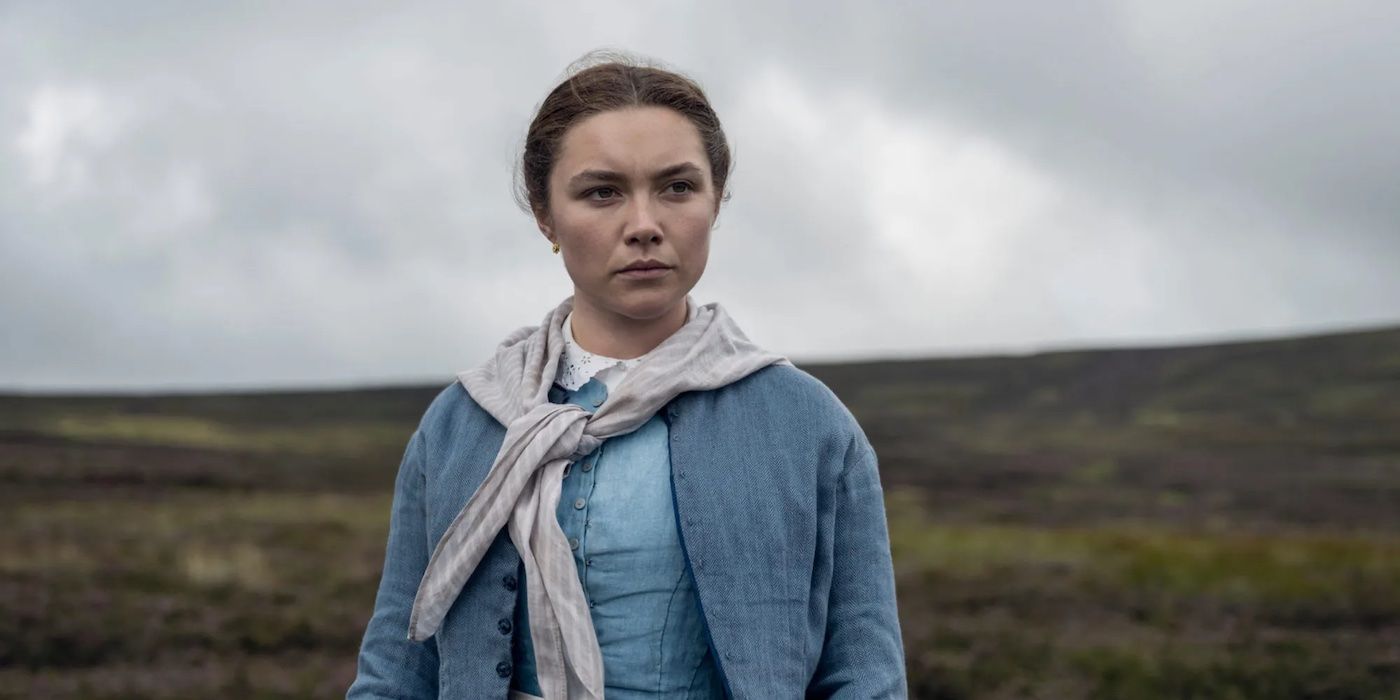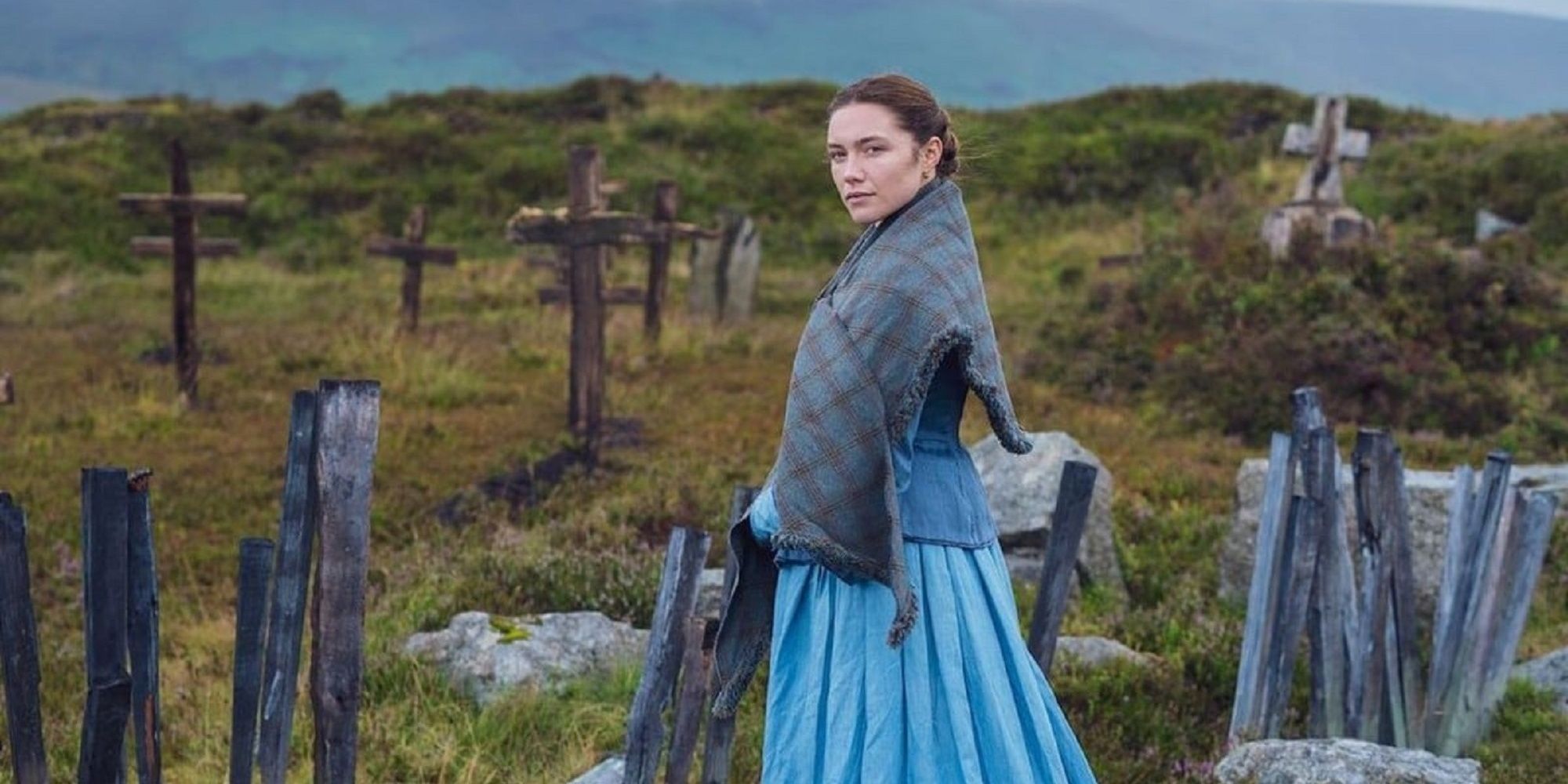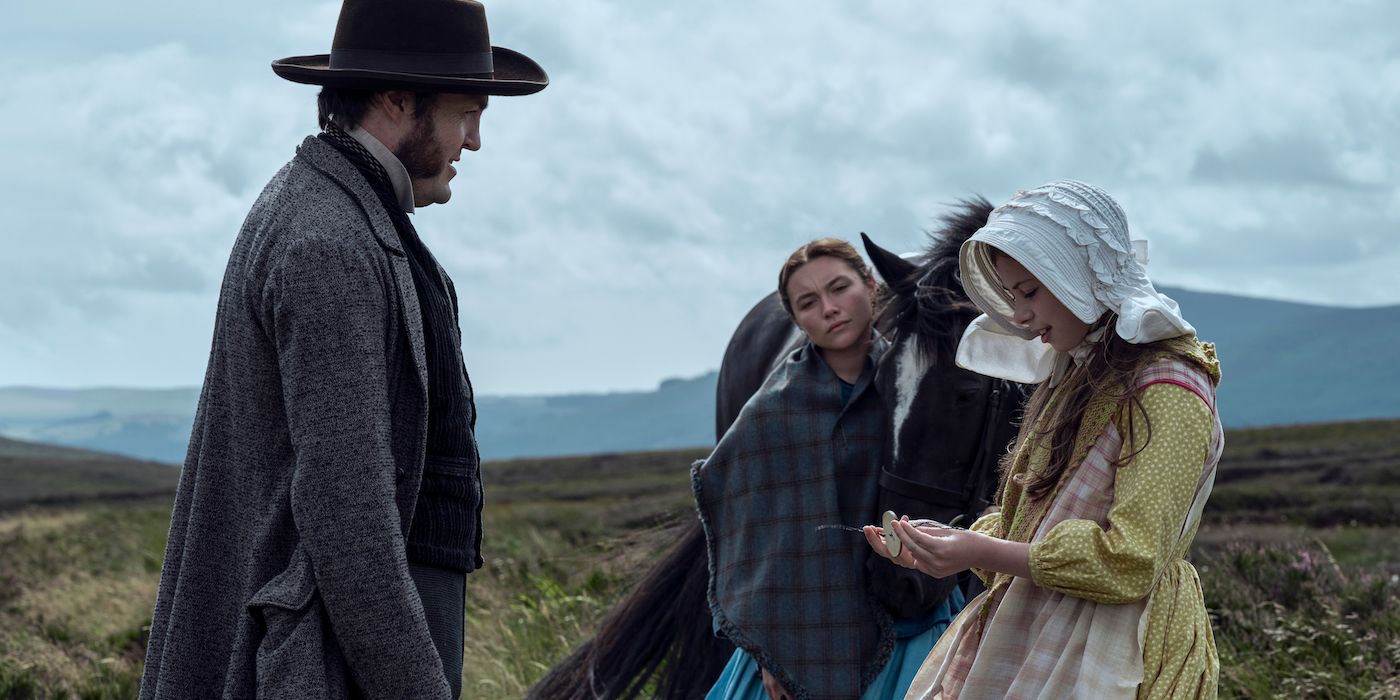This review was originally a part of our 2022 Toronto International Film Festival coverage.
The Wonder begins with an acknowledgment of the artifice inherent to what director Sebastián Lelio has created for us. While all films are themselves illusions, rarely does the very opening shot remind the audience of this. Over a glimpse at an almost empty warehouse of some kind that appears clean and sterile to the eye, we hear narration from lead Florence Pugh who begins monologuing about the film itself. She does so not in character, but as the actress herself. As the camera begins to move, she makes the case for the importance of stories themselves. The camera then settles on a set with Pugh’s Lib Wright who is traveling to a remote community in Ireland. It is important to put a pin in this prologue as the film leaves it behind for almost the entirety of an experience that becomes both evocative and erratic.
What follows is a film that serves as a fraught conversation with itself and the nature of storytelling which is flawed yet fascinating to behold. Based on the novel of the same name by Emma Donoghue, we are transported back to the 19th century where we discover that Lib is a nurse who has been hired to look into a mysterious medical impossibility. Specifically, it is that an 11-year-old girl named Anna O’Donnell (Kíla Lord Cassidy) has not been eating for several months yet seems to be in perfectly good health. What then begins is a watch where Lib and a nun will take turns keeping an eye on the child to ascertain what is happening. They do so under the direction of a small board that includes one Dr. McBrearty, played by an underutilized yet terrific Toby Jones, who seems to have gotten swept up in the spectacle.
Lib, on the other hand, is skeptical of almost everything that is playing out. The more she attempts to learn about the family and what is taking place, the more she grows to realize that her job is merely meant to affirm the supposed “miracle” they've received. While she does not believe in any faith, the family of the girl and the many visitors who come to see her are devout to a potentially dangerous degree. The only other person that Lib seems to have a connection with is William Byrne (Tom Burke) who has come to the area to seek the truth in his capacity as a journalist. However, even he has his own perspective on the situation that occasionally runs counter to hers. Also operating in the background is Kitty (Niamh Algar) who seems to be aware of what is really happening and, based on a couple of very significant shots, may even be aware that we are watching as an audience. Regardless, she isn’t much help to Lib who begins to form an attachment to Anna that stems from a loss that each has endured.
The film is an odd experience that, often despite some of its inclinations, still sinks underneath your skin. Much of this is due to how Pugh delivers a dynamic performance that excels in the quieter moments as her character methodically tries to piece together what is happening. She is dedicated to the pursuit of truth and clings to the idea that this will be the way to complete the assignment that she has been called here to do. Soon, this becomes more than a job for Lib and Pugh remains as spectacular as ever in teasing out the motivations of her character. Some showy moments undercut her performance, but she remains as resolute as ever in seeing it through. The fact that the film is written by Alice Birch, who also wrote the unsettling Lady Macbeth that made Pugh one to watch, might tempt one to put it in conversation with that prior film. While both are thrillers of sorts that take place in similar settings, The Wonder plays out with a more self-reflective perspective that can often get tangled up in itself. Many scenes serve to only further tie the story into knots.
With that being said, there is something arresting in seeing it attempt to untangle itself, much of this because of the way it embraces an eerie atmosphere. The score by Matthew Herbert is key to this as it bounces back and forth between sounding like a ghostly whalesong to the tense ticking of a booming clock. It doesn’t hold back from letting this all wash over you, even as it feels like it may drown you in the cacophony of sound. While the story is initially centered around Lib getting to the bottom of what is happening in this small town, this soundscape gives it all a sense that there is something bigger happening. Indeed, it soon becomes clear that all the science and understanding of medicine that she has may itself be useless here. The film becomes increasingly about who can tell the best story, even if it flies in the face of truth. Faith is a powerful force and those who wield it can have immense sway over the world. It can be a tool of both salvation and of destruction when desperation takes hold.
This all requires a vagueness about what exactly it arrives at as the film delves into some rather grim revelations that are impossible to discuss without tipping off what is happening. Nothing ends up being too surprising as this isn’t a thriller that thrives off of twists and turns. Instead, everything is more grounded even as the presentation can feel like it is teetering into being a horror film. It never fully leaps into this as Lelio keeps it grounded in the many scenes of Lib looking and observing to best understand what is happening. Much of it doesn’t work in a manner that threatens to almost doom the whole thing, but Pugh keeps pulling it back from the brink of oblivion. If you want to watch it just to see her command center stage, there is plenty of that in the many confined conversations she has. She keeps us engaged even when the film does not, smoothing over many of the rougher patches that arise.
What makes it more intriguing towards the end is the way it seems to pull back the curtain on itself, poking and prodding about what will be the most compelling story. It is by no means a perfectly constructed work, but there is something more immense in its thematic aspiration that provides plenty for Pugh to play around with. All that makes it unwieldy also makes The Wonder mesmerizing so that, even when the spell is broken, you can’t shake it from your mind.
Rating: B-
The Wonder is now playing in select theaters and comes to Netflix on November 16th.



